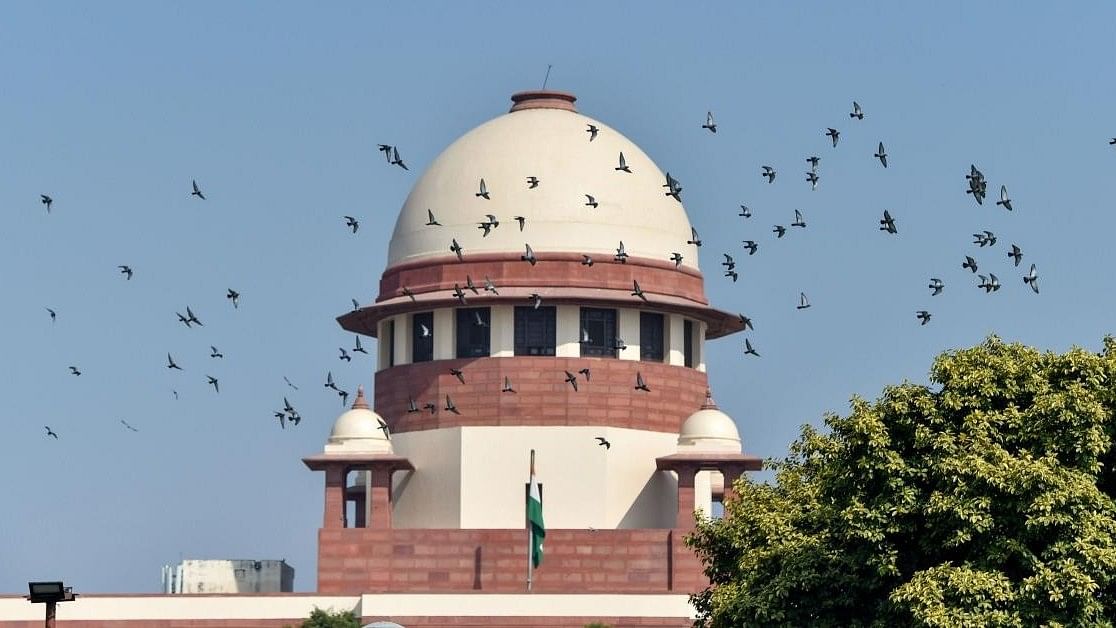
A view of the SC.
Credit: PTI Photo
New Delhi: The Supreme Court has asked the Union government to take urgent and prompt measures to address "highly sensitive and important" issue of establishment of a comprehensive rehabilitation framework for victims of sex trafficking, in view of legislative vaccum.
A bench of Justices J B Pardiwala and Manoj Misra granted three weeks time to the Union government to file an affidavit, giving details also on proposed steps to look into a phenomenal increase in cyber enabled sex trafficking.
The bench prima facie found that that as on date, no compliance or effect worth the name has been given to the order passed by this court on December 9, 2015 and the issues raised by the petitioner, NGO Prajwala still remained to be considered.
"We may only say that the issues involved in this litigation are highly sensitive and important. They relate to the protection that needs to be afforded to the victims of sex trafficking. Human and sex trafficking are crimes that dehumanises the victim and violates the victim’s right to life, freedom and personal security. Vulnerable sections of society, especially women and children are disproportionately affected in such crimes," it said in an order on November 12.
Acting on an application seeking compliance of December 9, 2015 directions, the court said a statement was made by the Centre on oath that the Ministry of Home Affairs would set up the “Organized Crime Investigative Agency” (OCIA) to take care of the victims of sex trafficking.
This was to be made functional before December 1, 2016 and the Ministry of Women and Child Development was to constitute a Committee under the Chairmanship of the Secretary, Ministry of Women and Child Development, Government of India for preparing a comprehensive legislation dealing with the subject of sex trafficking, the court noted.
However, the Union government on second thought, dropped the idea of setting up the OCIA. Instead, it thought fit to amend the NIA Act by introducing two provisions in it. A Bill to enact a new Act, namely, the Trafficking of Persons (Prevention, Protection and Rehabilitation) Bill, 2018 was introduced, which was passed in Lok Sabha yet could not be cleared in the Rajya Sabha as the Parliament got dissolved.
The Bill was re-drafted as the Trafficking of Persons (Protection, Care and Rehabilitation) Bill, 2021 and published for the purpose of inviting suggestions. Thereafter, the said Bill, incorporating the suggestions and comments as received, was re-introduced afresh for Cabinet approval. Since then, there has been no legislative progress on this matter, the bench noted.
Stressing on importance of the issue, the court said the victims of such crimes are often mistreated by their traffickers and have to endure physical and mental forms of violence that are inflicted upon them. They stand at a greater risk of sustaining several life-threatening injuries, and contracting infections and illnesses, including sexually transmitted diseases. Additionally, the mental health consequences can range from anxiety disorders, Post Traumatic Stress Disorder (PTSD), depression and substance abuse as well.
"A majority of such victims may require continuous access to doctors and other mental health professionals who can tend to their specific needs. Alienation and ostracism by the larger society is also inherently associated with such crimes. Individuals who are trafficked are often abruptly alienated from their immediate family and other social groups due to the attribution of sentiments like guilt and shame on the victims," the court said.
Highlighting the unfortunate consequence of the victims being further isolated, secluded and withdrawn from society, the bench said the crime is also of such nature that it seriously hampers the pursuit of further education and learning.
"Once the victims stop going to schools or colleges, it is all the more difficult to reintroduce them into the formal education system and equip them with advanced education which is quintessential for their right to live freely. Victims might also need support in order to get job opportunities and secure their means of livelihood," the bench said.
The bench said the issue clearly highlighted that while the prevention of trafficking of persons, along with the prosecution and punishment of the offenders who commit such heinous crimes are important, yet it is equally important that legislative mechanisms focus on providing care, protection and rehabilitation to the victims of trafficking.
"This must be done by creating a larger legal, economic and social environment that secures the well-being of the victims. It is the need of the hour to adopt a human rights and rehabilitative approach to such crimes," the bench said.
The court fixed the matter for further consideration on December 10.
